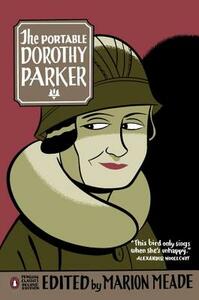Take a photo of a barcode or cover
One of my favorite poets. I am in love with the Lost Generation and the 20s in general. What a burst of creativity and messiness. Some of my favorite poems include "A Portrait," "Coda," & "Incurable."
emotional
inspiring
reflective
sad
slow-paced
funny
informative
reflective
slow-paced
I actually read the more recent Penguin Classics edition with some extra material and a pretty snazzy cover. Not a huge fan of poetry (I'm not sure how to read it?!) but am a big fan of the short stories and criticism.
For some reason, I didn't expect Dorothy Parker (knowing next to nothing about the author before picking up this text) to have such acerbic wit. Sometimes her satires are hard to swallow - An Arrangement Black & White, The Sexes, Big Blonde, etc - and create a powerful discomfort that forces one to think, feel, imagine life in 1920's - 1940's NYC.
I love her poetry, filled with bon mots and sardonic parodies. The metric rhyme reinforces the clever turns of phrase, underlining the poignancy and intention.
Most of all, I adored her short stories for their insight into her feelings and perception of the external world. Resonating through the pages is loneliness & unhappiness; fascination with the outside, the lively lives of others, parried with judgmental disdain.
Overall, this is an extraordinary collection. I wish someone had recommended Dorothy Parker to me in high school or college. She speaks to my perspective on feminism, and I would have enjoyed referencing her work in some of my essays on her contemporaries.
I love her poetry, filled with bon mots and sardonic parodies. The metric rhyme reinforces the clever turns of phrase, underlining the poignancy and intention.
Most of all, I adored her short stories for their insight into her feelings and perception of the external world. Resonating through the pages is loneliness & unhappiness; fascination with the outside, the lively lives of others, parried with judgmental disdain.
Overall, this is an extraordinary collection. I wish someone had recommended Dorothy Parker to me in high school or college. She speaks to my perspective on feminism, and I would have enjoyed referencing her work in some of my essays on her contemporaries.
funny, but depressing... took a long time to get through all the short stories and poems but it was worth it...
Not sure how to rate this. Some of her stories are really depressing. But her wit is undeniable, and there are some shrewd observations among the merely cynical ones.
Here are a few items that I noted in the latter portion of the tome.
From 'The Grandmother of the Aunt of the Gardener' 1931: "I am incapable of acquiring an extramural language. It is true that I can read French at glacier speed, muffing only the key-word of every sentence. It is true that I can understand it as spoken, provided the speaker is reasonably adept at pantomime."
From a review in Vanity Fair in December 1918: "There is always this to be said for the epidemic of Spanish influenza–it gave the managers something to blame things on. Whenever a manager saw that all was practically over with a play, he hid his aching heart under the guise of a noble solicitude for the public welfare, and with an air of 'It is a far, far better thing I do than I have ever done before,' announced that the play would be removed, owing to the epidemic."
A short poem called 'Sanctuary':
My land is bare of chattering folk;
The clouds are low along the ridges,
And sweet's the air with curly smoke
From all my burning bridges.
I was also struck by her short story ‘The Game’ -- it is essentially a horror story, played out in a newlywed woman’s drawing-room. (Trying to pinpoint where the horror comes from, I think it's that the reader grasps the general thrust of the revelations before the heroine does.)
Here are a few items that I noted in the latter portion of the tome.
From 'The Grandmother of the Aunt of the Gardener' 1931: "I am incapable of acquiring an extramural language. It is true that I can read French at glacier speed, muffing only the key-word of every sentence. It is true that I can understand it as spoken, provided the speaker is reasonably adept at pantomime."
From a review in Vanity Fair in December 1918: "There is always this to be said for the epidemic of Spanish influenza–it gave the managers something to blame things on. Whenever a manager saw that all was practically over with a play, he hid his aching heart under the guise of a noble solicitude for the public welfare, and with an air of 'It is a far, far better thing I do than I have ever done before,' announced that the play would be removed, owing to the epidemic."
A short poem called 'Sanctuary':
My land is bare of chattering folk;
The clouds are low along the ridges,
And sweet's the air with curly smoke
From all my burning bridges.
I was also struck by her short story ‘The Game’ -- it is essentially a horror story, played out in a newlywed woman’s drawing-room. (Trying to pinpoint where the horror comes from, I think it's that the reader grasps the general thrust of the revelations before the heroine does.)
I didn't like this as much as I thought I would. Most of what I read from it were the short stories, which after a while started to blend together. The characters struck me as being very similar, and the tone of the stories was a little on the frantic side. I didn't wind up finishing out the stories, and for the most part I didn't read the poetry. I believe there is also some nonfiction in the book but I didn't get to it if there is.
I love her wit, but I think I'm past these nit-picky, squabbling sort of stories. I recognize that she highlights the little inanities and foibles of life, relationships, and interactions; that she nails acerbic wit, the humor of the everyday, and the obsessions of our inner monologs. Still, it's a bit too much for me all together. Like an endless loop of small-mindedness. She does capture all the details of her class and era with aplomb. Yet still, without some sort of growth or a growing awareness, it is not a style for me.




